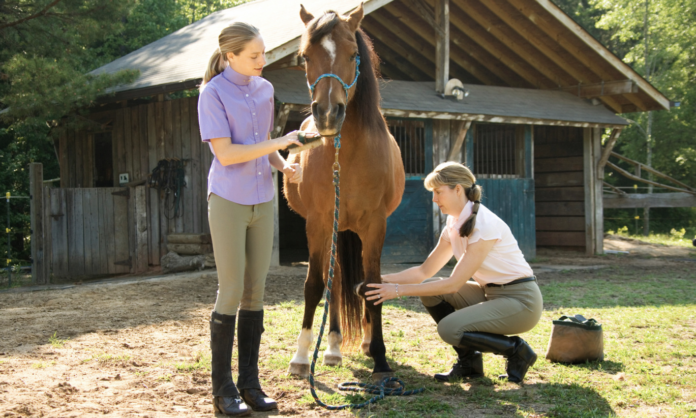Last Updated on July 18, 2023 by Fumipets
Tips for Managing Horse Diarrhea in Your Stable
Horse diarrhea can be a major problem for horse owners and stable operators. Unfortunately, diagnosing and treating equine diarrhea can be challenging, and the potential health risks for the horses under your stewardship are substantial.
Therefore, conferring with a vet if your horse displays any symptoms related to sickness, such as looseness of the bowels, is essential.
Nevertheless, you can take some preventive measures to keep your stable horses from suffering from this ailment.
Assess Your Stable’s Environment
The environment of a stable is key to helping horses stay healthy and preventing illnesses like diarrhea. Ensuring your stable is clean and well-maintained will go a long way toward keeping horses healthy.
Ensure the stalls are cleaned regularly, with all bedding removed at least once a week and replaced with fresh bedding.
Check the walls, ceilings, feeders, and other areas for signs of mold or mildew growth, which can harbor dangerous bacteria. In addition, guarantee that any aeration systems are in good working order and sufficient air movement in the stable.
Lastly, affirm that pure liquid is continually on hand and that all fodder repositories are kept neat and exempt from vermin or other pollutants.
Implement Good Feeding Practices
Good feeding practices are essential for maintaining horse health in any stable. Horses should be fed regularly with appropriate amounts of high-quality hay or grain, depending on their activity level or age.
All feed should be stored securely away from pests or other contaminants and checked regularly for signs of spoilage or mold growth.
Furthermore, it is vital to equip steeds with admittance to salt blocks or free salt as a segment of their eating regimen; this assists with keeping up legitimate electrolyte parity in the body, which can forestall sicknesses identified with lack of hydration like looseness of the bowels.
Keep Track of Symptoms
Scrutinizing variances in equine demeanor is critical to preserving their well-being; it’s particularly essential when confronting ailments like looseness of the bowels, which can have dire repercussions if disregarded.
Guarantee you monitor any fluctuations in craving or pep in your horses and any transformations in their droppings; if you recognize anything peculiar, converse with your doctor promptly.
Additionally, watch for signs of colic such as restlessness or rolling; digestive problems like diarrhea can sometimes cause colic, so prompt medical attention may be necessary if colic symptoms appear.
Provide Appropriate Treatment
If one of your equines exhibits diarrhea manifestations, immediate treatment is requisite to hinder more intricate issues such as desiccation or electrolyte incongruities.
In all likelihood, your vet will ordain an appropriate medication, such as an anti-diarrheal drug, and dutifully obey their edicts when delivering it to your horse.
Additionally, providing supportive care such as electrolyte supplements or probiotics may help speed recovery from acute cases of diarrhea; however, these should only be used under veterinary supervision as overuse can cause further health issues in some cases.
Practice Good Hygiene
Strict hygiene practices are also essential when dealing with horse diarrhea; this includes washing hands thoroughly after handling affected animals and cleaning and disinfecting any equipment used while treating the horse (such as blankets, buckets, etc.).
Furthermore, ensure that afflicted beasts are sequestered from other steeds until they have completely restored to obstruct contamination propagation; if practicable, establish different stalls so they do not interface with vigorous horses while they heal from the disorder.
Finally, ensure you dispose of manure properly by burying it away from pastures where it could contaminate food sources for other animals; this will help reduce the risk of spreading infectious organisms between animals on your property.
Conclusion
Horse diarrhea can have serious consequences if left untreated, so it’s important to prevent it whenever possible by maintaining a clean environment and providing good nutrition for your horses.
Additionally, keeping track of changes in behavior and implementing appropriate treatments promptly when symptoms appear will help minimize any potential complications due to illness, such as dehydration or electrolyte imbalances.
Finally, practicing good hygiene around affected animals will help reduce the risk of spreading infection between animals on your property which could lead to further outbreaks down the line. With these tips, you can manage horse diarrhea more effectively in your stable!


















